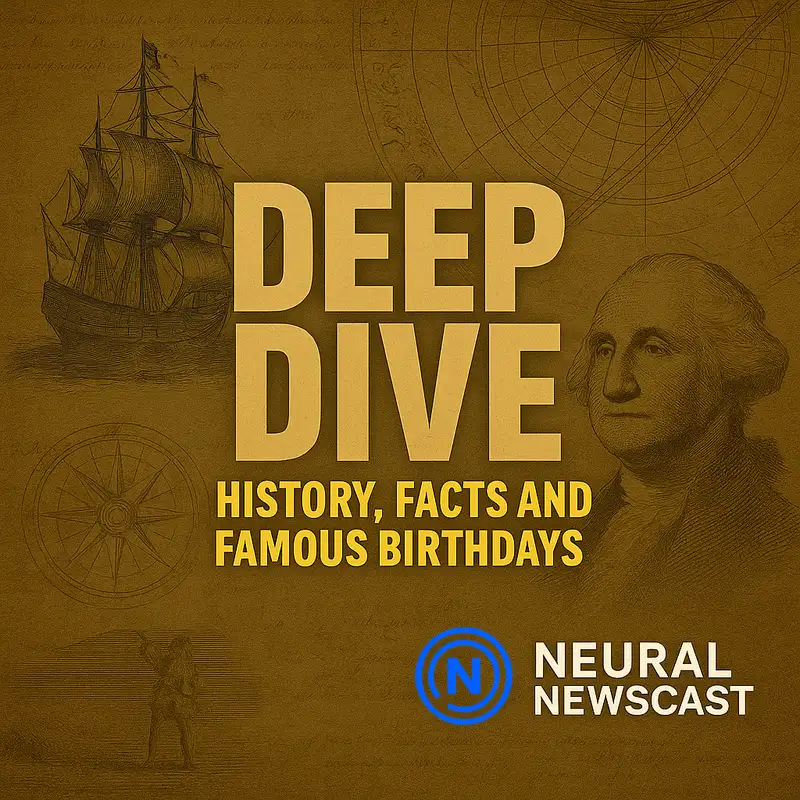Deep Dive: Honest Abe’s Turning Point, Sousa’s March, and the Rubber-Band Hack - November 6, 2025
AI-powered news, human-reviewed.
This is Neural Newscast.
Thanks for joining us for this Neural Newscast deep dive.
I'm Monica, your world correspondent.
Alongside me is Ethan, your entertainment reporter,
and together we're about to uncover some intriguing stories.
On this day in 1860, honest Abe, Abraham Lincoln,
was elected to the nation's highest office,
winning the US presidency and setting the stage
for profound national change.
That nickname carries real weight, Monica.
It's concise, humanizing, and paired with setting the stage for a profound national change.
You can feel the gravity of the moment.
Exactly.
In one line, you're invited to consider how that victory would redirect the nation's trajectory.
Winning the presidency inherently shifts policy and leadership at the highest level.
And the phrasing, winning the U.S. presidency and setting the stage, marks a turning point,
a public choice about to trigger consequences that reshape national life.
From a diplomatic and political lens, a presidential election signals as much to the world as
to domestic constituencies.
The moniker, honest Abe, foregrounds character while the office underscores institutional
importance.
Narratively, that blend matters.
The human being is right there in the nickname, while the outcome, becoming president, frames a course change for the country.
It's a compact but layered statement, a hint of integrity in the nickname, an electoral triumph at the highest level, and a clear consequence, profound national change, foreshadowed.
That mix of personality and consequence is why it resonates.
It's concise storytelling that primes you for the weight of what comes next.
In essence, the election outcome encapsulates leadership, legitimacy,
and the beginning of significant transformation for the country.
Short sentence, big implications.
Lincoln wins, becomes president, sets the stage.
You can almost hear history's drumroll.
We'll be right back after this short break.
Today we celebrate the birthdays of John Philip Sousa, 1854, Mike Nichols, 1931, and James
Naismith, 1861.
Nice lineup, a marchmaster, a groundbreaking director, and the inventor of basketball.
That's a lot of cultural ground in one day.
Let's focus on John Philip Sousa for a deeper look.
His role as composer and conductor reshaped how Americans heard public and military music,
with marches that became part of national identity.
Absolutely. The Stars and Stripes Forever alone is iconic. But what I find fascinating is how Sousa translated military formality into something accessible and emotional for the public.
He didn't just write catchy tunes, he professionalized the American marching band, elevating instrumentation, rehearsal standards, and touring practices so bands could be cultural ambassadors.
Right, and his touring meant those marches traveled beyond Washington and the big cities.
Local communities got a sense of national cohesion through live performance, which is a powerful
cultural export.
There's also an element of showmanship.
Souza's leadership as a conductor was theatrical without compromising musical rigor.
That balance helped the march endure as both entertainment and ceremony.
And people sometimes forget he was a savvy organizer too, establishing standards that other bands copied, which amplified his influence across military and civilian ensembles.
His music's clarity and rhythmic drive made it instantly recognizable, which is why his work still queues patriotism and pageantry today, long after his era.
Speaking of lasting cues, his ability to craft memorable motifs made marches that are adaptable, used at parades, films, and events.
So his fingerprints are everywhere, even if listeners don't always know his name.
That ubiquity underscores his historical impact.
Suza shaped not just compositions, but how a nation presents itself publicly through sound.
In juxtaposed with the other birthdays today, you see a neat cultural spectrum.
Nichols changing storytelling on stage and screen,
Naismith inventing a global sport, and Sousa giving a soundtrack to Civic Life.
Not bad for one calendar page.
We'll be right back after this short break.
Daily News, Synthesized and Verified.
This is Chad Thompson, the founder of Neural Newscast.
At Neural Newscast, we're all about making news fast, factual, unbiased, and human-reviewed.
Visit neuralnewscast.com for deep dives, special reports, and our full archive of content.
Welcome back to Neural Newscast Deep Dive.
Let's wrap with a quick useful fact.
Rubber bands last longer when refrigerated.
Intriguing and oddly practical, yes, refrigerating rubber bands extends their lifespan.
Colder storage slows the rubber's natural oxidation and keeps the polymer chains from breaking down as quickly.
So they keep their snap longer. Less brittleness. Less cracking.
Simple implication. If you want longer lasting rubber bands, the fridge works, ideally sealed to avoid moisture and odors.
Handy tip for anyone who relies on them regularly, office organizers, craft people, even backstage prop teams.
It's a small preservation practice with a clear practical benefit.
Keep a spare batch chilled and rotate as needed.
I'll picture a prop room fridge now, Monica.
Compact, efficient, and full of rubber bands.
We hope you enjoyed this deep dive.
For Monica and all of us at Neural Newscast, I'm Ethan.
Join us next time.
Thanks for tuning in to Neural Newscast.
Stay curious, stay informed, and visit NNewscast.com
for more daily news and fascinating stories from history.
At Neural Newscast, we mix real voices with AI-generated ones
to bring you fast, high-quality news.
Every story is created with AI but reviewed by humans to keep things accurate and fair.
While we do our best to prevent mistakes, AI isn't perfect.
So double-check key facts with trusted sources.
Want to know more about our AI process?
Head to endnewscast.com.
Creators and Guests


